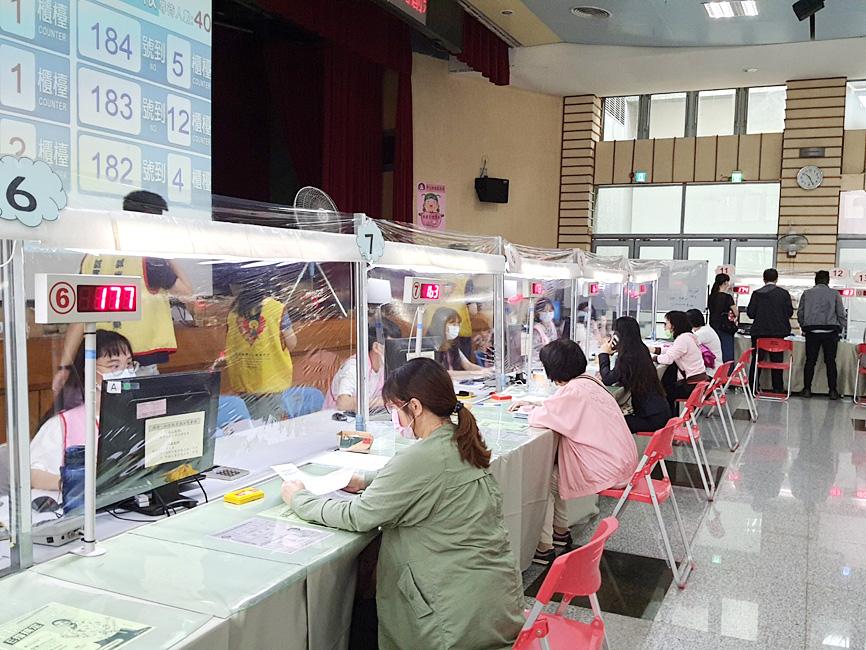The Ministry of Finance on Wednesday extended the deadline for filing tax returns for all taxpayers until June 30, after earlier saying the extension would only apply to people being treated for COVID-19 or those in isolation.
The ministry said that the extension of the May 31 deadline by one month was to reduce the risk of cluster infections by preventing crowding at National Taxation Bureau offices amid a record surge in domestic COVID-19 cases.
It on Tuesday announced that people who are being treated for the virus or are in isolation would have an extra month to file, but it revised that decision in response to calls by legislators for a general extension.

Photo: Hung Mei-hsiu, Taipei Times
The ministry in 2020 and last year extended the filing deadline for all taxpayers from May 31 to June 30 due to the COVID-19 pandemic.
This year’s extension would apply to individual and business tax filings and payments, as well as the payment of property taxes, the ministry said in a statement.
It would apply to an estimated 6.53 million individual income taxpayers and 990,000 business taxpayers, the ministry said.
In addition, the period for inquiry of income and deductions data for filing an individual income tax return, which was originally from yesterday to May 31, is also extended to June 30.
People who file their returns online or by telephone during the extended period should expect their return, if eligible for one, by July 29 as previously scheduled, the ministry said.
The ministry said people who are eligible to file online should do so using the ministry’s e-filing and tax payment service at https://tax.nat.gov.tw/index.html, or by using their regional tax office’s Web site to avoid the risk of infection.
For additional information, people can call the ministry’s toll-free telephone number: 0800-000-321, it said.

OPTIMISTIC: The DGBAS sharply upgraded its GDP growth estimate from 3.54 percent to 7.71 percent after the Taiwan-US trade agreement signing and given AI optimism The US imported more from Taiwan than China for the first time in decades, as US President Donald Trump’s tariffs reshape trade flows while a global boom in artificial intelligence (AI) fuels demand for tech products. US purchases of goods from China plunged almost 44 percent in December last year from 2024 to US$21.1 billion, US Department of Commerce data showed on Thursday. By contrast, shipments from Taiwan more than doubled during the same period to US$24.7 billion. The soaring Taiwanese shipments to the US reflect the huge expansion in supplies of chips and servers for AI companies, which has completely changed

The Central Election Commission has amended election and recall regulations to require elected office candidates to provide proof that they have no Chinese citizenship, a Cabinet report said. The commission on Oct. 29 last year revised the Measures for the Permission of Family-based Residence, Long-term Residence and Settlement of People from the Mainland Area in the Taiwan Area (大陸地區人民在台灣地區依親居留長期居留或定居許可辦法), the Executive Yuan said in a report it submitted to the legislature for review. The revision requires Chinese citizens applying for permanent residency to submit notarial documents showing that they have lost their Chinese household record and have renounced — or have never

US and Chinese fighter jets briefly faced off above waters near the Korean Peninsula this week, Yonhap News agency reported, marking a rare confrontation in that area between the two superpowers. About 10 US fighter jets on Wednesday departed an airbase in Pyeongtaek, South Korea, for drills above international waters off South Korea’s western coast, the news outlet cited unidentified military sources as saying. While the US planes did not enter China’s air defense identification zone, Beijing scrambled planes as they neared that region, the report said. “The Chinese People’s Liberation Army organized naval and air forces to monitor and effectively respond

Taiwan has secured another breakthrough in fruit exports, with jujubes, dragon fruit and lychees approved for shipment to the EU, the Ministry of Agriculture said yesterday. The Animal and Plant Health Inspection Agency on Thursday received formal notification of the approval from the EU, the ministry said, adding that the decision was expected to expand Taiwanese fruit producers’ access to high-end European markets. Taiwan exported 126 tonnes of lychees last year, valued at US$1.48 million, with Japan accounting for 102 tonnes. Other export destinations included New Zealand, Hong Kong, the US and Australia, ministry data showed. Jujube exports totaled 103 tonnes, valued at